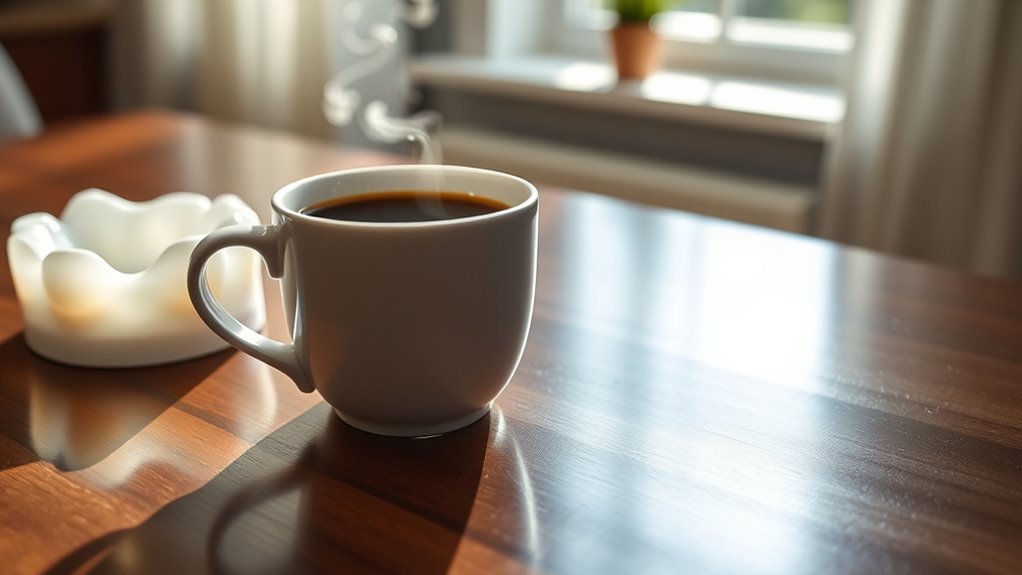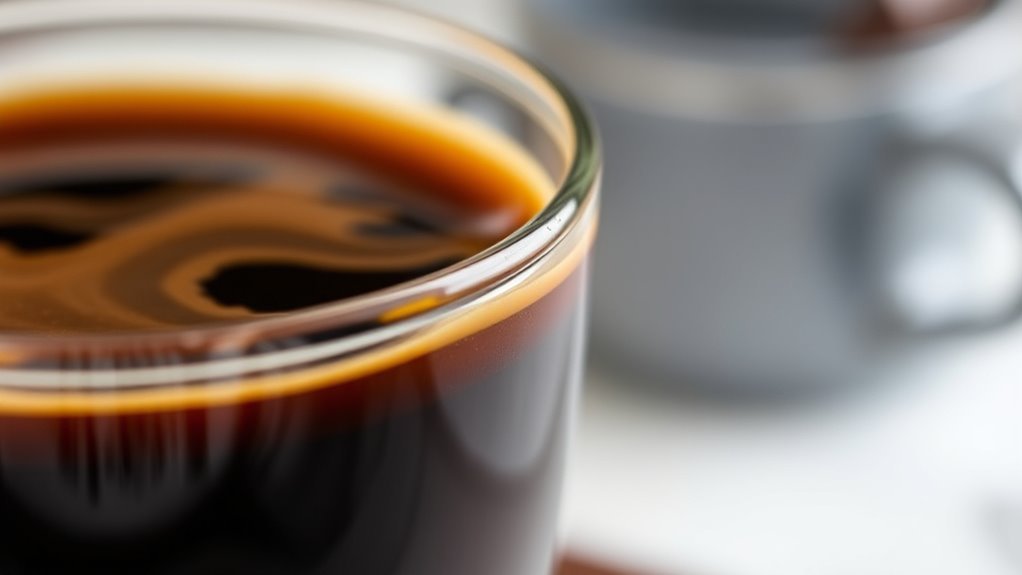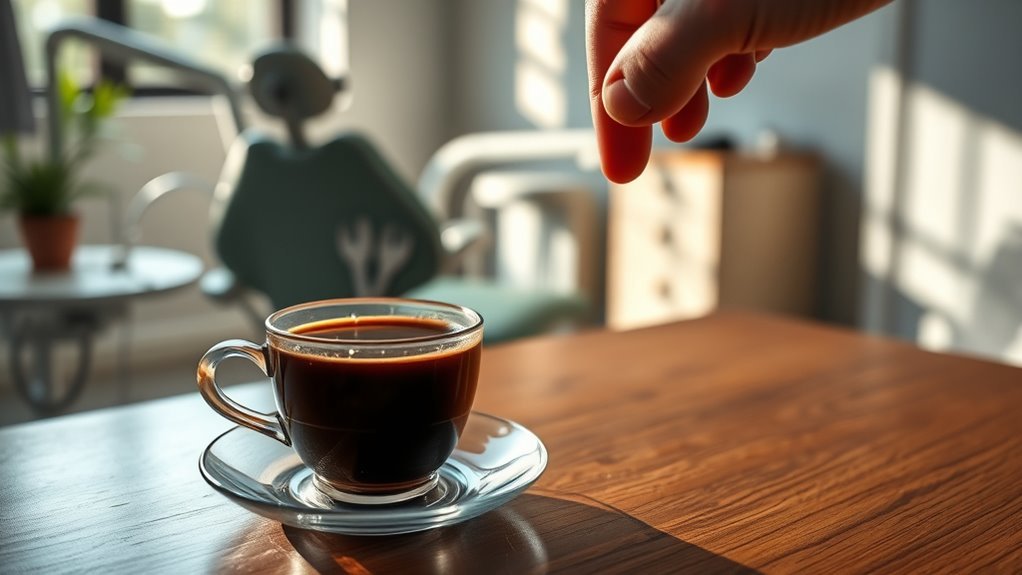Can I Drink Coffee After Permanent Crown
After getting a permanent crown, it’s best to wait at least 24 hours before drinking coffee, especially hot beverages. Hot drinks can increase sensitivity and might risk damage to the crown. Additionally, coffee can stain crowns, particularly porcelain ones. To minimize these risks, consider using a straw, rinsing your mouth afterward, or opting for less staining alternatives. If you’re curious about more tips and long-term care for your crown, there’s plenty to explore further.
Understanding Permanent Crowns and Their Purpose

When you receive a permanent crown, it’s essential to understand its purpose and benefits. A permanent crown serves to restore the strength, function, and aesthetics of a damaged tooth. These crowns are made from various crown materials, including porcelain, metal, or a combination of both, chosen based on your specific needs and preferences. They’re often utilized in dental procedures following root canals, severe decay, or fractures. By providing a protective covering, crowns can prevent further damage and enhance your overall dental health. Understanding their role can empower you to make informed decisions about your dental care, ensuring that your smile remains healthy and vibrant. Embracing this knowledge can truly enhance your freedom in managing your oral health.
Immediate Post-Treatment Care
After getting a permanent crown, it’s essential to follow specific post-treatment care guidelines. You’ll want to avoid heat exposure, as it can affect the healing process, and be certain to wait until the anesthesia wears off before eating or drinking. Additionally, adhering to your dentist’s instructions will guarantee a smooth recovery and best results.
Avoid Heat Exposure
To guarantee the best outcome following the placement of a permanent crown, it’s vital to avoid exposing the area to heat immediately after the procedure. Your newly crowned tooth may experience heat sensitivity, making it important to refrain from consuming hot beverages like coffee or tea. Heat can exacerbate discomfort and hinder proper healing, so give your dental care the attention it deserves. Opt for cooler foods and drinks during the initial recovery phase to minimize any potential irritation. This precaution helps confirm that your crown remains securely in place and reduces the risk of complications. By prioritizing these guidelines, you’ll support your overall dental health and enjoy the benefits of your permanent crown for years to come.
Wait for Anesthesia
While your mouth is still numb from anesthesia, it’s important to avoid consuming anything, including coffee. The anesthesia duration can vary, but it typically lasts for a few hours. During this time, your ability to feel hot or cold sensations is compromised, which increases the risk of burns or injuries. Post-treatment effects, such as swelling or discomfort, can also complicate your recovery if you consume hot beverages prematurely. It’s best to wait until the numbness completely subsides before enjoying anything to drink. This precaution not only guarantees your safety but also promotes a smoother recovery process. Taking these steps allows you to enjoy your favorite beverages without complications later on.
Follow Dentist Instructions
Following your dentist’s instructions is vital for a successful recovery after receiving a permanent crown. Adhering to the post-operative instructions provided by your dentist will guarantee ideal healing and prevent complications. For the first 24 hours, it’s advisable to avoid hard, sticky, or chewy foods that could dislodge the crown. If you’ve been given specific guidelines regarding pain management or oral hygiene, be sure to follow them closely. Maintaining good dental care habits during this period is important; gentle brushing and rinsing can help keep the area clean without disturbing the crown. Remember, your dentist’s recommendations are designed to promote healing and maintain your oral health, so take them seriously for a smoother recovery.
Sensitivity Issues After Crown Placement
After getting a permanent crown, you might experience some temporary sensitivity, especially to hot and cold temperatures. This sensitivity is common and can vary in duration from a few days to a few weeks. Understanding what to expect can help you manage any discomfort during your recovery.
Temporary Sensitivity Post-Procedure
Experiencing temporary sensitivity after receiving a permanent crown is quite common and often expected. This sensitivity can result from the adjustment of your tooth and surrounding gum tissue. To manage this discomfort effectively, consider using over-the-counter pain relief options, such as ibuprofen or acetaminophen, as they can help alleviate any pain. Additionally, practice sensitivity management by avoiding extremely hot or cold foods and beverages for a few days following the procedure. Maintaining good oral hygiene is also essential; gentle brushing and rinsing can help soothe your gums. If the sensitivity persists or worsens, don’t hesitate to contact your dentist for further guidance. They may recommend additional treatments to guarantee your comfort during the healing process.
Hot and Cold Sensitivity
While it’s normal to encounter hot and cold sensitivity after crown placement, understanding the reasons behind this discomfort can help you manage it effectively. Here are some common factors contributing to sensitivity:
- Hot beverage effects: Extreme temperatures can shock the nerve endings.
- Cold sensitivity triggers: Cold substances may lead to sharp discomfort.
- Recent dental work: The process can irritate surrounding tissues.
- Crown material: Some materials can be more prone to temperature sensitivity.
- Underlying dental issues: Previous decay or damage can exacerbate discomfort.
To alleviate sensitivity, consider moderating your intake of hot and cold items. You might also want to consult with your dentist if the discomfort persists, ensuring your crown is fitting properly and there are no other underlying issues.
Duration of Sensitivity Issues
Although sensitivity following crown placement is common, the duration can vary considerably from person to person. Typically, you’ll experience temporary discomfort for a few days to a couple of weeks. Factors like your individual pain threshold, the complexity of the procedure, and the materials used in your crown can all influence the sensitivity duration. While some may feel relief within a week, others might need a bit more time to adjust. It’s essential to monitor your symptoms and reach out to your dentist if discomfort persists beyond a few weeks. They can assess your situation and recommend appropriate solutions to help alleviate any ongoing sensitivity, ensuring your comfort and oral health are prioritized.
The Impact of Hot Beverages on Dental Health
When considering the impact of hot beverages on dental health, it is crucial to recognize that temperature can markedly affect both natural teeth and dental restorations. Hot beverages can influence your dental enamel and potentially lead to issues down the line. Here are some hot beverage effects you should keep in mind:
- Increased sensitivity in teeth
- Risk of enamel erosion with high temperatures
- Potential for discomfort around dental restorations
- Greater likelihood of cracks in weakened teeth
- Heightened risk of thermal shock to dental work
Being mindful of these factors can help you maintain better oral health. While enjoying your favorite hot drinks, consider waiting until they cool slightly to minimize any adverse effects on your dental health.
Staining Potential of Coffee on Crowns

Because coffee is known for its rich color and acidity, it can pose a staining risk to dental crowns, particularly those made from porcelain or composite materials. Coffee stains can be stubborn, and while some crowns resist discoloration better than others, it’s essential to contemplate the type of crown material you have. Porcelain crowns may absorb more pigments from coffee, leading to visible stains over time. On the other hand, metal crowns are less prone to staining but can still be affected by the surrounding tooth structure. If you enjoy coffee, understanding its staining potential on your crowns allows you to make informed choices. Being proactive can help maintain the aesthetic appearance of your dental work while enjoying your favorite beverage.
Tips for Enjoying Coffee Safely
To enjoy your coffee without compromising your dental crowns, it’s essential to adopt a few simple strategies. Here are some tips for maintaining your crowns while savoring your favorite brew:
- Choose lighter coffee blends to minimize staining.
- Use a straw to limit contact with your crowns.
- Rinse your mouth with water after drinking coffee.
- Limit sugar and acidic additives, which can affect enamel.
- Consider coffee alternatives like herbal teas or flavored water for variety.
Alternatives to Coffee Post-Crown

If you’re looking for alternatives to coffee after getting a permanent crown, there are plenty of options that can satisfy your cravings without risking damage to your dental work. Consider herbal teas, like chamomile or peppermint, which provide a soothing experience without caffeine. If you still crave a warm drink, try golden milk—a blend of turmeric, milk, and spices. For a revitalizing twist, opt for iced matcha or green tea, both excellent caffeine substitutes that offer a gentle energy boost. Additionally, consider chicory root coffee, which mimics coffee’s flavor without the acidity. These coffee alternatives can help you enjoy your beverage without compromising your dental health while keeping your taste buds satisfied.
Long-Term Care for Your Crown
While maintaining good oral hygiene is essential after getting a permanent crown, understanding long-term care practices will help guarantee its durability and functionality. Proper crown maintenance will not only prolong the life of your crown but also assure your overall oral health. Here are some key practices to keep in mind:
Maintaining good oral hygiene and long-term care practices is crucial for the durability and functionality of your permanent crown.
- Brush twice daily with fluoride toothpaste.
- Floss daily to remove plaque around the crown.
- Avoid hard foods that could damage the crown.
- Schedule regular dental check-ups for professional cleanings.
- Monitor for any signs of discomfort or changes in the crown.
When to Consult Your Dentist

Even with diligent care, there may be times when you need to consult your dentist regarding your permanent crown. If you experience any pain, sensitivity, or discomfort that persists beyond a few days, it’s crucial to seek professional advice. Changes in your bite or visible damage to the crown could indicate underlying issues that require attention. Additionally, if you notice discoloration or inflammation around the crown, this may signal a problem with your dental hygiene or crown care. Regular check-ups are essential for monitoring the health of your crown and surrounding teeth. Staying proactive about your dental health guarantees longevity and functionality, allowing you to enjoy your favorite beverages, including coffee, without worry.
Final Thoughts on Coffee Consumption After Crown Placement
After getting a permanent crown, it’s natural to wonder about your coffee consumption. While you can enjoy your favorite brew, consider a few important factors for crown maintenance:
- Wait at least 24 hours before consuming hot beverages.
- Opt for moderate temperatures to avoid damaging the crown.
- Be mindful of staining; coffee can affect the appearance of your crown.
- Explore coffee alternatives like herbal teas or decaf options.
- Pay attention to how your mouth feels after drinking coffee.
Frequently Asked Questions
Can Coffee Weaken the Bond of My Permanent Crown?
You might wonder if coffee could weaken the bond of your permanent crown. While coffee itself won’t directly damage the crown’s durability, its acidity can affect the surrounding gum tissue. If you enjoy your morning brew, moderation is key. Maintaining good oral hygiene and regular dental visits is essential for ensuring your crown stays intact. So, indulge in your coffee, but be mindful of how it interacts with your overall dental health.
How Long Should I Wait Before Drinking Hot Coffee?
After getting a permanent crown, it’s wise to wait at least 24 hours before sipping hot coffee. This allows the bonding material to set properly, reducing the risk of crown sensitivity. Additionally, consider the temperature of your beverages; extremely hot drinks can cause discomfort to your newly crowned tooth. By giving it some time, you’ll enjoy your coffee without worrying about potential issues with your crown. Enjoy freedom in your choices, but prioritize your dental health!
Does Coffee Affect My Gum Health After Crown Placement?
You might worry that coffee could harm your gum health after getting a crown, but it doesn’t have to be a concern. While coffee can cause gum irritation in some people, moderating your intake and maintaining good oral hygiene can help mitigate any risks. Additionally, coffee’s staining potential is more of an aesthetic issue than a health one. Just be sure to brush regularly to keep your gums and teeth healthy.
Will Coffee With Milk Impact My Crown Differently?
When you drink coffee with milk, it might impact your crown differently. Milk’s acidity is lower than that of black coffee, which can help reduce the risk of discoloration. However, keep in mind that any beverage can contribute to staining over time. To maintain your crown’s appearance, it’s best to enjoy such drinks in moderation and practice good oral hygiene. Regular dental check-ups can also help keep your crown looking its best.
Are There Specific Brands of Coffee Safer for My Crown?
When considering specific brands of coffee that might be safer for your crown, it’s important to note that the materials used in your crown can influence its durability. While no brand is universally safe, opting for low-acid coffee alternatives might be beneficial. These can reduce the risk of potential staining or damage. Always consult your dentist for personalized recommendations, ensuring your choice aligns with the materials in your crown for ideal longevity.






